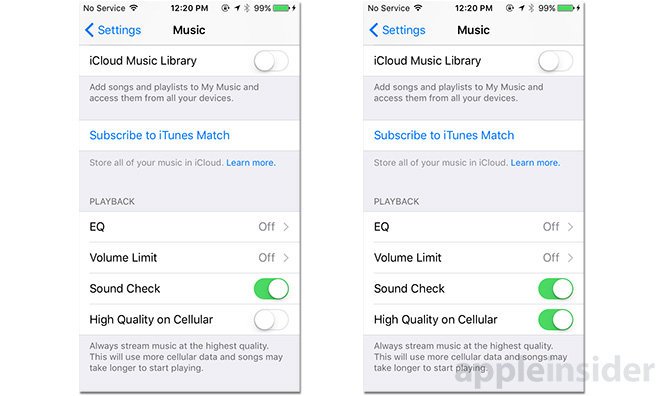It appears Apple is planning to give on-the-go Apple Music users the option to stream tunes at high bitrates when iOS 9 debuts later this year, as the latest beta released Wednesday includes a toggle switch for high quality audio streaming over cellular networks.
Currently, Apple Music automatically adjusts streaming bitrates based on a determination of whether an iPhone or iPad is connected to Wi-Fi or a cellular data network. Through a Settings menu option in iOS 9 beta 3, however, users can force Apple Music into streaming high quality audio at all times.
Shortly after Apple Music launched with iOS 8.4, Apple SVP of Internet Software and Service Eddy Cue confirmed the service varies bit rates depending on whether a device is connected to Wi-Fi or cellular. The measure is commonly instituted by streaming music services to offer customers an acceptable listening experience, while saving them money on costly mobile data plans.
Competitors in the space are already fielding similar options, including companies like Jay-Z's Tidal which actively tout high-bitrate streaming as part of their marketing strategy.
With iOS 9 beta 3, Apple includes a brief warning to users not familiar with high bitrate streaming, saying, "This will use more cellular data and songs may take longer to start playing."
Exact Apple Music bitrates remain undisclosed, though previous reports claimed streams max out at 256kbps, lower than offerings from Spotify and the erstwhile Beats Music. Debate rages on over whether bitrates are an accurate indicator of audio quality, however. Since higher bitrates carry more information, some argue that higher quality audio logically follows, while others contend efficient file formats like AAC can achieve equivalent or better sound with lower overhead.
In any case, the iOS 9 streaming option is a welcome addition for those with a penchant for high-quality sound and who also have large or unlimited data allotments.
 Mikey Campbell
Mikey Campbell








 Chip Loder
Chip Loder
 Wesley Hilliard
Wesley Hilliard
 Marko Zivkovic
Marko Zivkovic

 Christine McKee
Christine McKee
 Amber Neely
Amber Neely

 Malcolm Owen
Malcolm Owen








55 Comments
Now that is going to be affordable. ????
I'll answer the quality question as a musician: Anything above 256kbps is virtually indistinguishable on common playback methods (car audio, consumer stereo equipment, ear buds, higher end consumer headphones, etc.). This is especially true for the most common genres of Rap, Rock, Pop, R&B, Electronic/Dance, and even Jazz. A trained ear will likely hear differences is depth and timbre when listening to Classical (specifically orchestral) on good equipment. Even then, only Hi-Fi enthusiasts are going to care. As to more efficient codecs, I agree that's a factor as well. I recall several purchased 128kbps iTunes files sounding better than things I encoded at higher rates, usin both AAC and other formats. The question becomes whether or not you will notice a difference between 128 and 256. Possibly. But not everyone will, and fewer will really care. As a member here said years ago, we've finally reached the point in audio where it's no longer about sounding better, it's about sounding good enough.
Since its "high bit rate for cellular" it likely simply means the same max of 256kbs AAC as over wifi. Let's not get too enthusiastic over this yet. But, I did meet with the top guy with Meridian in charge of the MQA project there the end of May. He indicated that Apple was a licensor of the format, without actually saying so. You know how that goes. But if that's true, it would need new hardware to take advantage of it, as it needs hardware and the software decoder to function in high quality mode. So there's the possibility of new iPhones, iPods, iPads, and Macs that COULD come out with this later this year.
[quote name="SDW2001" url="/t/187126/option-for-high-quality-apple-music-streaming-over-cellular-shows-up-in-ios-9-beta#post_2745891"]I'll answer the quality question as a musician: Anything above 256kbps is virtually indistinguishable on common playback methods (car audio, consumer stereo equipment, ear buds, higher end consumer headphones, etc.). This is especially true for the most common genres of Rap, Rock, Pop, R&B, Electronic/Dance, and even Jazz. A trained ear will likely hear differences is depth and timbre when listening to Classical (specifically orchestral) on good equipment. Even then, only Hi-Fi enthusiasts are going to care. As to more efficient codecs, I agree that's a factor as well. I recall several purchased 128kbps iTunes files sounding better than things I encoded at higher rates, usin both AAC and other formats. The question becomes whether or not you will notice a difference between 128 and 256. Possibly. But not everyone will, and fewer will really care. As a member here said years ago, we've finally reached the point in audio where it's no longer about sounding better, it's about sounding good enough.[/quote] Actually, I disagree. In addition, I find that musicians are the worst people to ask about audio quality. I used to design and build professional audio equipment. My company made recording equipment, Amos and speakers for disco's, etc. We had Barbara Cook and Werner Klemperer. You may have heard of both. When in NYC I had them come to our listening room. They were hard pressed to tell the differences between speakers. They're not alone. As far as the type of music that's most affected, it's Electronic/dance that's affected most, and classical that'saffected least. That's because of the way these algorithms work. Since we hear poorly in higher frequencies for a number of sometime complex reasons, most of the energy removed is from higher frequencies. Perceptually, it's difficult to tell. But if music has a lot of energy in those frequencies, then it becomes more obvious. Nevertheless, really high end playback equipment will allow more subtle difference to be heard.
[quote name="SDW2001" url="/t/187126/option-for-high-quality-apple-music-streaming-over-cellular-shows-up-in-ios-9-beta#post_2745891"]I'll answer the quality question as a musician: Anything above 256kbps is virtually indistinguishable on common playback methods (car audio, consumer stereo equipment, ear buds, higher end consumer headphones, etc.). This is especially true for the most common genres of Rap, Rock, Pop, R&B, Electronic/Dance, and even Jazz. A trained ear will likely hear differences is depth and timbre when listening to Classical (specifically orchestral) on good equipment. Even then, only Hi-Fi enthusiasts are going to care. As to more efficient codecs, I agree that's a factor as well. I recall several purchased 128kbps iTunes files sounding better than things I encoded at higher rates, usin both AAC and other formats. The question becomes whether or not you will notice a difference between 128 and 256. Possibly. But not everyone will, and fewer will really care. As a member here said years ago, we've finally reached the point in audio where it's no longer about sounding better, it's about sounding good enough.[/quote] The DAC matters as well. Wolfson DAC's (what Apple used to use until 2008) and Cirrus Logic DAC's do produce different sounds. It's subtle, but present.